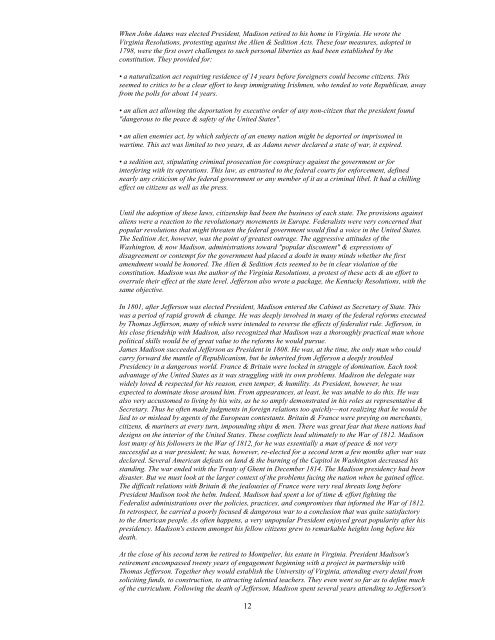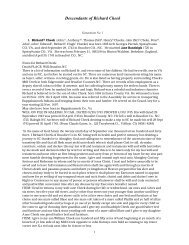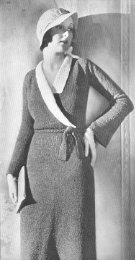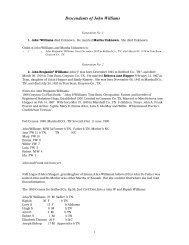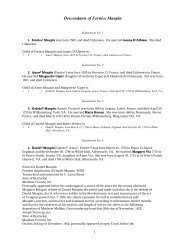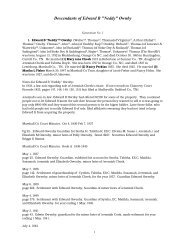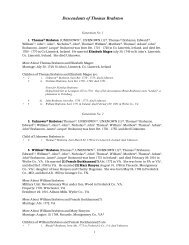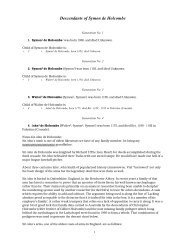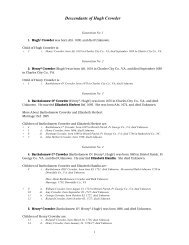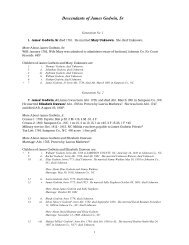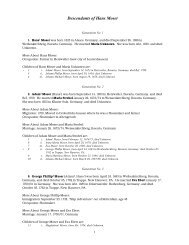Family Tree Maker - Cemetarian
Family Tree Maker - Cemetarian
Family Tree Maker - Cemetarian
- No tags were found...
You also want an ePaper? Increase the reach of your titles
YUMPU automatically turns print PDFs into web optimized ePapers that Google loves.
When John Adams was elected President, Madison retired to his home in Virginia. He wrote theVirginia Resolutions, protesting against the Alien & Sedition Acts. These four measures, adopted in1798, were the first overt challenges to such personal liberties as had been established by theconstitution. They provided for:• a naturalization act requiring residence of 14 years before foreigners could become citizens. Thisseemed to critics to be a clear effort to keep immigrating Irishmen, who tended to vote Republican, awayfrom the polls for about 14 years.• an alien act allowing the deportation by executive order of any non-citizen that the president found"dangerous to the peace & safety of the United States".• an alien enemies act, by which subjects of an enemy nation might be deported or imprisoned inwartime. This act was limited to two years, & as Adams never declared a state of war, it expired.• a sedition act, stipulating criminal prosecution for conspiracy against the government or forinterfering with its operations. This law, as entrusted to the federal courts for enforcement, definednearly any criticism of the federal government or any member of it as a criminal libel. It had a chillingeffect on citizens as well as the press.Until the adoption of these laws, citizenship had been the business of each state. The provisions againstaliens were a reaction to the revolutionary movements in Europe. Federalists were very concerned thatpopular revolutions that might threaten the federal government would find a voice in the United States.The Sedition Act, however, was the point of greatest outrage. The aggressive attitudes of theWashington, & now Madison, administrations toward "popular discontent" & expressions ofdisagreement or contempt for the government had placed a doubt in many minds whether the firstamendment would be honored. The Alien & Sedition Acts seemed to be in clear violation of theconstitution. Madison was the author of the Virginia Resolutions, a protest of these acts & an effort tooverrule their effect at the state level. Jefferson also wrote a package, the Kentucky Resolutions, with thesame objective.In 1801, after Jefferson was elected President, Madison entered the Cabinet as Secretary of State. Thiswas a period of rapid growth & change. He was deeply involved in many of the federal reforms executedby Thomas Jefferson, many of which were intended to reverse the effects of federalist rule. Jefferson, inhis close friendship with Madison, also recognized that Madison was a thoroughly practical man whosepolitical skills would be of great value to the reforms he would pursue.James Madison succeeded Jefferson as President in 1808. He was, at the time, the only man who couldcarry forward the mantle of Republicanism, but he inherited from Jefferson a deeply troubledPresidency in a dangerous world. France & Britain were locked in struggle of domination. Each tookadvantage of the United States as it was struggling with its own problems. Madison the delegate waswidely loved & respected for his reason, even temper, & humility. As President, however, he wasexpected to dominate those around him. From appearances, at least, he was unable to do this. He wasalso very accustomed to living by his wits, as he so amply demonstrated in his roles as representative &Secretary. Thus he often made judgments in foreign relations too quickly—not realizing that he would belied to or mislead by agents of the European contestants. Britain & France were preying on merchants,citizens, & mariners at every turn, impounding ships & men. There was great fear that these nations haddesigns on the interior of the United States. These conflicts lead ultimately to the War of 1812. Madisonlost many of his followers in the War of 1812, for he was essentially a man of peace & not verysuccessful as a war president; he was, however, re-elected for a second term a few months after war wasdeclared. Several American defeats on land & the burning of the Capitol in Washington decreased hisstanding. The war ended with the Treaty of Ghent in December 1814. The Madison presidency had beendisaster. But we must look at the larger context of the problems facing the nation when he gained office.The difficult relations with Britain & the jealousies of France were very real threats long beforePresident Madison took the helm. Indeed, Madison had spent a lot of time & effort fighting theFederalist administrations over the policies, practices, and compromises that informed the War of 1812.In retrospect, he carried a poorly focused & dangerous war to a conclusion that was quite satisfactoryto the American people. As often happens, a very unpopular President enjoyed great popularity after hispresidency. Madison's esteem amongst his fellow citizens grew to remarkable heights long before hisdeath.At the close of his second term he retired to Montpelier, his estate in Virginia. President Madison'sretirement encompassed twenty years of engagement beginning with a project in partnership withThomas Jefferson. Together they would establish the University of Virginia, attending every detail fromsoliciting funds, to construction, to attracting talented teachers. They even went so far as to define muchof the curriculum. Following the death of Jefferson, Madison spent several years attending to Jefferson's12


